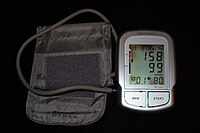
Photo from wikipedia
The present study aimed to investigate the effects of the combination of Marukome Nenrin miso, which has natriuretic effects, and Marukome MK-34-1 miso, which has potent angiotensin converting enzyme inhibitory… Click to show full abstract
The present study aimed to investigate the effects of the combination of Marukome Nenrin miso, which has natriuretic effects, and Marukome MK-34-1 miso, which has potent angiotensin converting enzyme inhibitory effects, on blood pressure (BP) in humans. A total of 40 subjects aged 40–69 years with high-normal BP or stage I hypertension were randomly assigned to two groups: 1) the miso group (32 g 2:1 w/w Nenrin and MK-34-1 with 3.8 g salt/day) or 2) the control soy food group (14.4 g soy food with 0.2 g salt/day). The levels of major nutrients were equal in the miso and control food servings, except for the fiber and Na levels, which were higher in the miso food serving. Daytime and nighttime BP were measured with an automated BP monitor. Compared with the soy food intake, miso intake for 8 weeks did not affect daytime clinical BP but significantly decreased nighttime BP without affecting pulse rate (PR). Moreover, miso shifted the nighttime BP profile to lower levels than those at baseline. Soy food intake did not change the nighttime BP profile after 8 weeks. Miso intake also tended to reduce nighttime BP in a subgroup with stage 1 hypertension compared with the results of the soy food group participants and shifted the nighttime BP profile toward lower levels than those recorded at baseline. Miso intake did not influence lipid or glucose metabolism. In conclusion, this is the first report showing that miso reduces nighttime BP in humans. Miso may do so by shrinking the fluid spaces in the body and/or deactivating the adrenergic nervous system.
Journal Title: Hypertension Research
Year Published: 2019
Link to full text (if available)
Share on Social Media: Sign Up to like & get
recommendations!